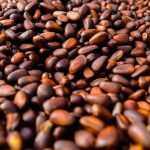
Could increasing our consumption of carrots and green tea help reduce memory loss? When mice are fed a diet of compounds which are found in carrots and green tea, scientists at the University of Southern California found their visual and spatial skills and their memory could recover or be restored.
Lets face it, any study in mice might be questionable but it often demonstrates that plant-based supplements when used in combination with drugs can help to reduce the symptoms of dementia. In this case the study showed a slowing down of Alzheimer’s.
The study in the Journal of Biological Chemistry looked at two compounds, epigallocatechin 3-gallate (EGCG) and ferulic acid (FA). These are very effective antioxidants and they are often cited as compounds of great importance in general health benefits. They are also compounds which explain the benefits of drinking green tea or of eating certain healthy foods including carrots.
In this study, the main author Dr Terrence Town, who is a professor of physiology and neuroscience at USC’s Keck School of Medicine, wanted to know what impact these two antioxidants had on behaviour in mice.
In this study, four groups of eight mice with the equivalent condition of Alzheimer’s were added to by a similar number of healthy mice of both sexes. Each group had one of four diets which was either both compounds, one of each or none at all which served as the placebo. The dosage level was 30 mg of each compound per kilogram of body weight. This is a typical dose level for humans and would be consumed as part of a healthy, plant based diet or found in supplements.
The mice were required to do a simple maze test in the shape of a Y. The test assessed how well they could find their way out. Essentially it tests their spatial working memory. The study also confirmed that EGCG and ferulic acid reduced inflammation and oxidative stress in those mice which are risk factors associated with Alzheimer’s disease.
The findings showed the healthy mice instinctively explored each arm in the Y maze. They were examining the route for food or to escape. The mentally impaired mice could not do this as well as their more healthy counterparts. It appears that after three months the combination therapy helped restore memory loss with the mice with Alzheimer’s performing equally as well as the originally healthy mice.
However it is worth noting that the FDA has told a number of businesses selling supplements to combat Alzheimer’s disease and memory loss to cease making wild claims. For example it these claims on products have not been approved because they suggest the product is a drug.
- “Green tea may also help to reduce the occurrence of Alzheimer’s disease.”
- “Green tea also works to block the proteins that can cause plaque to develop and lead to Alzheimer’s disease.”
- “Studies have shown that green tea supplements may help to fight the accumulation of proteins that can lead to Alzheimer’s disease.”
The claims on the web-site suggested that the product should be used as a drug. It is important to bear in mind that any product for sale as a food is certainly not to be used as a medicine. Whilst we are interested in green tea as a healthy product all regulatory bodies are very cautious about businesses promoting products with unsubstantiated health claims.
Reading Further About Green Tea
Various green tea products are available to purchase online. It is always a good idea to compare different brands, and different types of green tea, to choose those most suitable for consumption.
Reference
Mori, T., Koyama, N., Tan, J., Segawa, T.,Maeda, M., Town, T. (2019) Combined treatment with the phenolics (−)-epigallocatechin-3-gallate and ferulic acid improves cognition and reduces Alzheimer-like pathology in mice. Journal of Biological Chemistry 294, pp. 2714-2731 http://www.jbc.org/content/294/8/2714.abstract



Leave a Reply